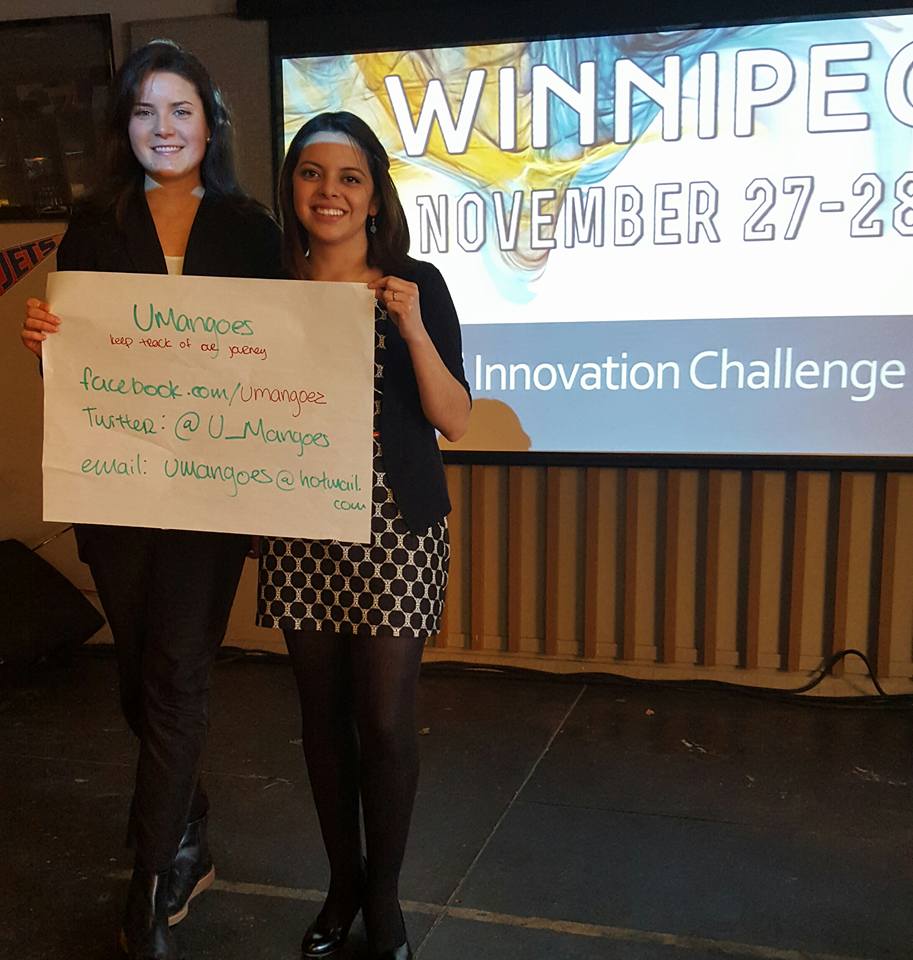
U of M students Laura Pelser and Nancy Barajas were award $2,000 toward the UMangoes project.
Service-Learning team, UMangoes wins top prize at Social Innovation Challenge
Student pitch to turn food waste into a social enterprise impresses panel of funders.
Have you ever heard about mangoes from Manitoba? If you haven’t you will soon have the chance to discover these delicious fruits connecting the Manitoba and El Salvador. Thanks to the Social Innovation Challenge two of U of M students will have the chance to kick-start UMangoes, a social enterprise connecting communities, providing opportunities and reducing waste.
The easiest way to describe the Social Innovation Challenge (SIC) is that it is a “Dragons’ Den that brings people together from all sectors; non-profit, advocacy, business, faith and more to talk about the solutions they have for problems that matter,” says Tessa Blaikie Whitecloud, funding developer for 1JustCity. Over two days, the SIC brought together 22 teams at the Hub to pitch ideas from community members interested in social change. SIC events are held throughout the country and often present solutions to over 10 social issues. Diversity is not only represented through the themes and issues addressed in the competition but through composition of the teams and the professionals, potential funders, and supporters that attend the event as members of the audience or judges. The SIC is a great place to make connections and get ideas off the ground.
“Reducing food waste and improving people’s health is something that I am passionate about,” says Laura Pelser human nutritional sciences student, one of the two U of M students who worked on the project. UMangoes initiative seeks to dehydrate mangoes using low-cost technology and export them to Manitoba as a fair trade product. The project will start in the spring of 2016 as part of the ongoing relationship between the Service-Learning office at the U of M and rural communities in El Salvador. “One of my favourite parts of the program is that it facilitates cooperation and continuity; we want to motivate fellow students to get involved and to be proud of the great potential and positive results that communities can achieve when they work in solidarity,” says Nancy Barajas, the other UMangoes member and student at the Asper School of Business.
The project is addressing needs identified by the community. “UMangos peaked my interest right away. These students have identified a sustainable idea that will help a community thrive,” explains Rachel Courey, one of mentors of the UMangoes team. “It is important that students aren’t simply engaging in voluntourism. This work is about relationships between the community and the university. The project has the ability to empower both students and the community in El Salvador. I’m proud to have contributed to such a wonderful initiative.”
David Arenas, Service-Learning coordinator leading the UMangoes students, commented on the approach and objectives of the program. “Service-Learning is an innovative approach to education that combines service in the community with guided reflection sessions. With UMangoes our goal is for the students to learn about larger social justice issues affecting other communities and how it is that students can work together with communities for achieving social change without displacing labour or imposing foreign values.”
UMangoes won $2,000 at the Social Innovation Challenge to begin the project, as well as other in-kind donations and support that will help them bring dried mangoes to our city. In the spring of 2016 the students will begin their work in El Salvador. You can follow the team on twitter @U_mangoes or facebook.com/umangoes.
To find out more about Service-Learning at the University of Manitoba or to apply for a local or international service-learning opportunity, visit the Service-Learning website.






